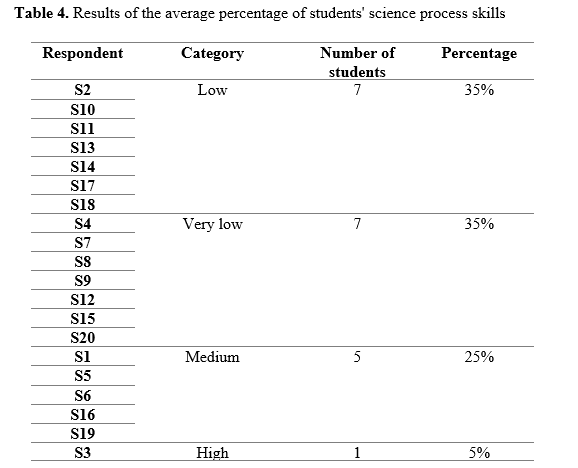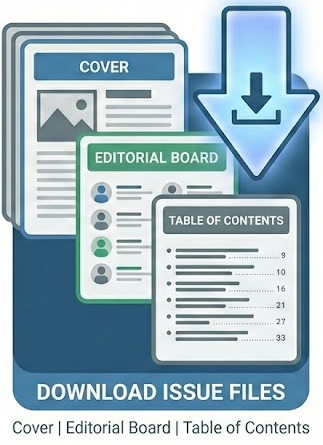Analysis of Junior High School Students’ Science Process Skills in Environmental Pollution Based on Ethnoscience and Local Wisdom
DOI:
https://doi.org/10.30736/seaj.v6i1.910Keywords:
environmental pollution, science process skillAbstract
Science process skills are skills in which student’s thinking skills are trained. The purpose of this study was to determine the level of science process skills at SMPN 2 Geger in terms of environmental pollution. The type of research used is descriptive quantitative non-expperimental. The research population was all students of class VII SMPN 2 Geger. Sampling using saturated sampling technique. The sample used in this study was 20 students of class VII SMPN 2 Geger. The instrument used was a test of student’s science process skills in the environmental pollution sub-material in the form of 12 essay questions. The research results obtained show that the average each student is included in the low category, with an average value of 32%.ÂDownloads
References
Alfakihuddin, M. L. B., Falashifah, F., Purnomo, T., Prasetyawati, N. D., Puspitasari, D., Tanjung, R., Patilaiya, H. L., Rahmatullah, I., & Sulistyo, P. B. (2022). Pencemaran Lingkungan. Sumatera Barat: PT Global Eksekutif Teknologi
Amir, Safilu, & Yuris, M. (2019). Pengaruh Model Problem Based Learning dan Pola Asuh Orang Tua Tehadap Keterampilan Proses Sains Peserta didik MTs. Jurnal Biofiskin, 1(1), 37-48
Annisa, M. N., et al. (2020). Pentingnya Pendidikan Karakter Pada Anak Sekolah Dasar di Zaman Serba Digital. Jurnal Pendidikan dan Sains, 2(1), 35-48. Diakses dari http://ejournal.stitpn.ac.id
Aseptianova, A., Nawawi, S., & Yuliandina, M. (2019). Pengembangan Asesmen Biologi Berbasis Keterampilan Berpikir Kritis Siswa Kelas Xi Semester Genap Di Sma Muhammadiyah 1 Palembang. BIOEDUKASI (Jurnal Pendidikan Biologi), 10(1), 1. https://doi.org/10.24127/bioedukasi.v10i1.2001
Ayu, D., Hastuti, W., & Wiyanto, W. (2019). Pengaruh Model Pembelajaran Guided Inguiry dengan Metoe Eksperimen Terhadap Keterampilan Proses Siswa. UPEJ Unnes physics Education journal, 8(3), 288-298.
Budhiawan, A., Susanti, A., & Hazizah, S. (2022). Analisis Dampak Pencemaran Lingkungan Terhadap Faktor Sosial dan Ekonomi pada Wilayah Pesisir di Desa Bagan Kuala Kecamatan Tanjung Beringin Kabupaten Serdang Bedagai. Jurnal Pendidikan Tambusai, 6, 240–249. https://www.jptam.org/index.php/jptam/article/view/2859
Choirunnisa’, M.A. & Rosdiana, L. (2023). Application of Guided Inquiry Learning Model to Improve Junior High School Students' Science Process Skills.Science Education and Application Journal (SEAJ), 5(2), 118-123. https://doi.org/10.30736/seaj.v5i2.871.
Duda, H. J., Susilo, H., & Newcombe, P. (2019). Enhancing different ethnicity science process skills: Problem-based learning through practicum and authentic assessment. International Journal of Instruction, 12(1), 1207–1222. https://doi.org/10.29333/iji.2019.12177a
Febriyanto, R. (2021). Analisis Sampah Domestik. Banten: CV TRL KARYA
Fitriana, F., Kurniawati, Y., & Utami, L. (2019). Analisis Keterampilan Proses Sains Peserta Didik Pada Materi Laju Reaksi Melalui Model Pembelajaran Bounded Inquiry Laboratory. JTK (Jurnal Tadris Kimiya), 4(2), 226–236. https://doi.org/10.15575/jtk.v4i2.5669
Fitriani, R., Maryani, S., Chen, D., Aldila, F. T., Br.Ginting, A. A., Sehab, N. H., & Wulandari, M. (2021). Mendeskripsikan Keterampilan Proses Sains Siswa melalui Kegiatan Praktikum Viskositas di SMAN 1 Muaro Jambi. PENDIPA Journal of Science Education, 5(2), 173–179. https://doi.org/10.33369/pendipa.5.2.173-179
Gasila, Y., Fadillah, S., & Wahyudi. (2019). Analisis Keterampilan Proses Sains Siswa Dalam Menyelesaikan Soal IPA di SMP Negeri Kota Pontianak. Jurnal Inovasi Dan Pembelajaran Fisika, 06(1), 14–22
Geovana, D., Akbar, B., & Supardi. (2023). Pengembangan Soal Keterampilan Proses Sains (Kps) Mata Pelajaran Biologi. Inspirasi Dunia: Jurnal Riset Pendidikan Dan Bahasa, 2(1), 24–38
Hardianti, A. N., Setiawan, Beni. (2023). Application of the Ethnoscience-Based Guided Inquiry Learning Model to Improve Science Process Skills in the Material of the Human Excretory System. Science Education and Application Journal, 5(2), 1-8. https://doi.org/10.30736/seaj.v5i2.872.
Hardianti, R. D. & Permatasari, I. U. (2023). Promoting Students’ Science Process Skills Through Predict Discuss Explain Observe Discuss Explain Implementation. Unnes Science Education Journal, 12(1), 1-6. http://dx.doi.org/10.15294/usej.v12i1.65648.
Harefa, D., & Sarumaha, M. (2020). Teori Pengenalan Ilmu Pengetahuan Alam pada Anak Usia Dini. Yogyakarta: PM Publisher.
Hasanah, Alif Nur, Purwandari, & Marsiti. (2023). Project Based Learning Model to Improve Communication Skills and Science Learning Outcomes.Science Education and Application Journal (SEAJ), 5(2), 80-88. https://doi.org/10.30736/seaj.v5i2.813.
Husniyah, Hidayati, Y., Qomaria, N., & Munawaroh, F. (2019). Pengembangan Perangkat Pembelajaran Model Poe Dengan Teknik Concept. Natural Science Education Reseach, 2(2), 123–132.
Islami, S., Yanto, D. T. P., & Candra, O. (2020). Validitas Jobsheet Instalasi Perumahan Berbasis Proyek Berbantuan E-Learning Di Pendidikan Vokasi. INTECOMS: Journal of Information Technology and Computer Science, 3(2), 174–178. https://doi.org/10.31539/intecoms.v3i2.1814
Isti’adah, F. N. (2020). Teori-Teori Belajar dalam Pendidikan (Rahmat Pernama(ed)). Edu Publisher
Jayusman, I., & Shavab, O. A. K. (2020). Aktivitas Belajar Mahasiswa Dengan Menggunakan Media Pembelajaran Learning Management System (Lms) Berbasis Edmodo Dalam Pembelajaran Sejarah. Jurnal Artefak, 7(1), 13. https://doi.org/10.25157/ja.v7i1.3180
Juhji, J., & Nuangchalerm, P. (2020). Interaction between scientific attitudes and science process skills toward technological pedagogical content knowledge. Journal for the Education of Gifted Young Scientists, 8(1), 1–16. https://doi.org/10.17478/jegys.600979.XX
Kusumastuti, A., Khoiron, A. M., & Achmad, T. A. (2020). Metode Penelitian Kuantitatif. Yogyakarta: CV BUDI UTAMA.
Lestari, M. Y., & Diana, N. (2018). Keterampilan proses sains (KPS) pada pelaksanaan praktikum Fisika Dasar I. Indonesian Journal of Science and Mathematics Education, 1(1), 50–54. http://ejournal.radenintan.ac.id/index.php/IJSME/article/view/2474/1828
Mardhiyah, R. H., Aldriani, S. N., & Chitta, F. (2021). Pentingnya Keterampilan Belajar di Abad 21 Sebagai Tuntutan dalam Pengembangan Sumber Daya Manusia. Jurnal Pendidikan, 12(1), 29-40.
Melinda, N., & Bire, M. H. (2021). Pencemaran Lingkungan Berbasis Problem Based Learning (PBL). Yogyakarta: Deepublish
Misa, S. F., Lidi, M. W., & Jariyah, A. (n.d.). Efektivitas Penerapan Model Pembelajaran Group Investigation Terhadap Keterampilan Proses Sains Siswa SMPN 1 Bajawa Utara. 7(1), 54–61.
Mufidah, E., & Zaitun, S. (2021). Pengaruh Model Pembelajaran Demonstrasi dengan Bantuan Media Audiovisual terhadap Hasil Belajar Siswa Sekolah Dasar pada Pembelajaran Tematik. IBTIDA’, 2(01), 51-60. http://ganda.kemdikbud.go.id
Muhali, M. (2019). Pembelajaran Inovatif Abad Ke-21. Jurnal Penelitian Dan Pengkajian Ilmu Pendidikan: E-Saintika, 3(2), 25. https://doi.org/10.36312/e-saintika.v3i2.126
Nafsah, W. Z., Muharrami, L. K., Hadi, W. P., & Rosidi, I. (2019). Analisis Keterampilan Proses Sains Siswa Menggunakan Pendekatan Contextual Teaching and Learning Dengan Model Discovery Learning Pada Materi Tata Surya. Natural Science Education Research, 2(2), 167–173. https://doi.org/10.21107/nser.v2i2.6252
Nensy, N. (2019). Analisis Keterampilan Proses Sains siswa Kelas XI SMA Negeri 1 Tanjungpinang. Pedagogi Hayati, 3(2), 19–23. https://doi.org/10.31629/ph.v3i2.1417
Nosela, S., Siahaan, P., & Suryana, I. (2021). Pengaruh Model Pembelajaran Level of Inquiry Dengan Virtual Lab Terhadap Keterampilan Proses Sains Peserta Didik Sma Pada Materi Fluida Statis. Journal of Teaching and Learning Physics, 6(2), 100–109. https://doi.org/10.15575/jotalp.v6i2.11018
Noviani, D. R. L. (2019). Pengaruh Pembelajaran Demonstrasi Interaktif terhadap Keterampilan Proses Sains Dasar Siswa SMA pada Materi Perubahan Lingkungan. Assimilation: Indonesian Journal of Biology Education, 2(2), 58–64. https://doi.org/10.17509/aijbe.v2i2.20249N
Nurhadi. (2020). Transformasi Teori Kognitivisme dalam Belajar dan Pembelajaran. Bintang : Jurnal Pendidikan Dan Sains, 2(1), 16–34. https://ejournal.stitpn.ac.id/index.php/bintang/article/view/540
Oktavia, D., & Mustamin, A. A. B, Walid, A. (2021). Development of an Assessment to Measure Science Process Skills for the Interaction of Living Things with Their Environment in Junior High School. Science Education and Application Journal, 3(2), 113-118. DOI: 10.30736/seaj.v3j2.427.
Pamudiah, M. K., Setiawan, B. (2023). Application of Student Worksheets Based on Ethnoscienceof Tempe Making on Biotechnology Material to Improve Science Process Skills. Science Education and Application Journal. 5(2). 99-108. https://doi.org/10.30736/seaj.v5i2.873.
Putri, D. A., Subekti, H., & Sari, D. A. P. (2020). Peningkatan Keterampilan Proses Sains Siswa pada Materi Pencemaran Lingkungan melalui Model Pembelajaran Problem Based Learning. Pensa E-Jurnal: Pendidikan Sains, 8(3), 248–253.
Rahayu, S., Ahied, M., Hadi, W. P., & Wulandari, A. Y. R. (2021). Analisis Keterampilan Proses Sains Siswa Smp Pada Materi Getaran Gelombang Dan Bunyi. Natural Science Education Research, 4(1), 28–34. https://doi.org/10.21107/nser.v4i1.8389
Rani, I. M. (2019). Analisis Keterampilan Proses Sains Peserta Didik Sma Kelas X Di Kecamatan Seberang Ulu I Dan Kertapati Palembang. Jurnal Biologi Dan Pembelajarannya (JB&P), 6(1), 23–31. https://doi.org/10.29407/jbp.v6i1.12515
Rosyidah, M., & Fijra, R. (2021). Metode Penelitian. Yogyakarta: CV BUDI UTAMA.
Rusyadi, A. (2021). Pembelajaran Ipa Berbasis Inkuiri Terbimbing. Prosiding Magister Pendidikan IPA, 61–66. http://jbse.ulm.ac.id/index.php/PMPIPA/article/view/25
Saleh, S. Y., Muhiddin, N. H., & Rusli, M. A. (2020). Studi Keterampilan Proses Sains (Kps) Peserta Didik Kelas Viii Smp Negeri 12 Makassar. Jurnal IPA Terpadu, 3(2), 75–86. https://doi.org/10.35580/ipaterpadu.v3i2.11294
Santiawati, S., Yasir, M., Hidayati, Y., & Hadi, W. P. (2022). Analisis Keterampilan Proses Sains Siswa Smp Negeri 2 Burneh. Natural Science Education Research, 4(3), 222–230. https://doi.org/10.21107/nser.v4i3.8435.
Septaria, K., & Rismayanti, R. (2022). The effect of scientific approach on Junior High school students’ Scientific Creativity and Cognitive Learning Outcomes. Jurnal Penelitian dan Pengkajian Ilmu Pendidikan: e-Saintika, 6(3), 173-189.
Septaria, K., Nissak, K., & Wulandari, S. A. (2023). Student Identity and Guided Inquiry Learning in Junior High School Students: A Correlation Analysis. Jurnal Penelitian Pendidikan IPA, 9(10), 8351-8358
Nurika, L., Septaria, K., & Setyaningsih, S. (2024). Implementing Science Creativity In Junior High School Students Using A Pirporsal Learning Model On Energy Resources. INKUIRI: Jurnal Pendidikan IPA, 13(1), 36-41.
Septaria, K., Fatharani, A., Dewanti, B. A., & Utami, Z. R. (2024). Satuan Pendidikan Aman Bencana (SPAB) Berbasis Partisipatory Rural Appraisal di Madrasah Aliyah Sunan Santri Lamongan. TAAWUN, 4(02), 229-240.
Septaria, K. (2022). Kemampuan Bertanya Versus Hasil Belajar Kognitif Mahasiswa: Analisis Korelasi Kemampuan Bertanya Pada Level Mahasiswa IPA. EDUPROXIMA (Jurnal Ilmiah Pendidikan IPA) Universitas Bhinneka PGRI Tulung Agung, 4(2), 60-71.Walil, K., Suryawati, I., Akmal, N. (2021). Practicum-Based Inquiry Learning to Improve Learning Outcome of Students at Senior High School. Al-Ishlah Jurnal Pendidikan, 13(2), 1503-1512. DOI:10.35445/alishlah.v13i2.741.
Zeidan, A. H., & Jayosi, M. R. (2014). Science Process Skills and Attitudes toward Science among Palestinian Secondary School Students. World Journal of Education, 5(1), 13–24. https://doi.org/10.5430/wje.v5n1p13.

Downloads
Published
How to Cite
Issue
Section
License
Copyright (c) 2024 Science Education and Application Journal

This work is licensed under a Creative Commons Attribution-ShareAlike 4.0 International License.
Authors who publish with this journal agree to the following terms:
- Authors retain copyright and grant the journal right of first publication with the work simultaneously licensed under a Creative Commons Attribution-ShareAlike 4.0 International License that allows others to share the work with an acknowledgment of the work's authorship and initial publication in this journal.
- Authors are able to enter into separate, additional contractual arrangements for the non-exclusive distribution of the journal's published version of the work (e.g., post it to an institutional repository or publish it in a book), with an acknowledgment of its initial publication in this journal.
- Authors are permitted and encouraged to post their work online (e.g., in institutional repositories or on their website) prior to and during the submission process, as it can lead to productive exchanges, as well as earlier and greater citation of published work (See The Effect of Open Access).

This work is licensed under a Creative Commons Attribution-ShareAlike 4.0 International License.








